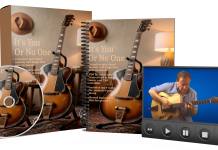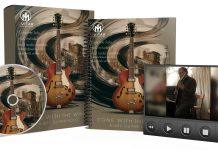This post may contain affiliate links. As an Amazon associate, Google associate as well as associate for other programs, Guitar & Music Institute may earn commissions from qualifying purchases.

If you have a passion for playing the guitar and a desire to share your knowledge with others, becoming a guitar teacher can be a rewarding career choice. Whether you’re just starting out or looking to enhance your teaching skills, this guide will provide you with expert tips and advice on how to become an effective and successful guitar teacher.
Key Takeaways:
- Teaching guitar requires a combination of musical expertise and effective teaching techniques.
- Developing a curriculum and planning guitar lessons are essential for providing structured and efficient instruction.
- Continuously improving your teaching skills and staying updated with the latest methods are key to keeping your lessons fresh and engaging.
- Building a strong online presence and marketing your services will help attract new students and grow your guitar teaching business.
- Having a positive attitude towards money and business is important for achieving financial success and maintaining a thriving teaching career.
Take Lessons Yourself
Taking guitar lessons yourself is a fundamental step in becoming an exceptional guitar teacher. Not only will it enhance your own playing abilities and knowledge, but it will also provide you with invaluable insights into teaching others effectively. By learning from a qualified teacher, you can develop your technique, gain teaching experience, and understand the nuances of guiding students.
“Learning never exhausts the mind.” – Leonardo da Vinci
By taking guitar lessons, you can continually improve your skills and deepen your understanding of musical concepts. Here are some key reasons why taking lessons is essential:
- Skill Development: Guitar lessons will help you refine your playing abilities and expand your musical repertoire.
- Guitar Technique: Learning from a qualified teacher will enable you to master proper technique, ensuring that you can teach your students with precision and accuracy.
- Teaching Experience: As you receive instruction, you’ll gain firsthand experience of being a student, allowing you to empathize with your own students and tailor your teaching strategies to their needs.
Ultimately, taking guitar lessons yourself is a crucial step toward developing into an exceptional guitar teacher. It not only enhances your own musical abilities but also equips you with the knowledge and experience necessary to guide your students effectively.
| Benefits of Taking Guitar Lessons | Reasons to Take Lessons |
|---|---|
| Improved playing abilities | Refine your guitar skills |
| Enhanced understanding of musical concepts | Expand your musical repertoire |
| Mastery of proper technique | Teach with precision and accuracy |
| Valuable teaching experience | Tailor your teaching strategies to student needs |
Study Guitar Method Books
Familiarizing yourself with guitar method books is essential for your journey as a guitar teacher. Many students rely on these resources for instruction, making them valuable teaching materials. By dedicating time to study guitar method books, you can enhance your ability to guide students effectively and provide them with a solid foundation in music theory.
One important aspect of studying guitar method books is learning sight-reading. This skill allows you to read and interpret musical notation, enabling you to teach students how to play music from sheet music. By understanding sight-reading yourself, you can simplify and break down complex musical passages for your students, making the learning process easier and more enjoyable.
Additionally, guitar method books cover various music theory concepts. By immersing yourself in these materials, you can deepen your understanding of music theory and pass on this knowledge to your students. This will enable you to explain key concepts, such as scales, chords, and progressions, with clarity and assist your students in applying theory to practice.
To emphasize the importance of studying guitar method books, renowned guitar teacher Joe Satriani once said,
“Learning to play the guitar is great, but learning to read music and understand music theory is essential if you want to teach others effectively.”
Top Guitar Method Books for Teaching
Note: The table below provides a list of highly recommended guitar method books for teaching purposes.
| Book Title | Author | Level |
|---|---|---|
| Guitar for Absolute Beginners | Daniel Emery | Beginner |
| Hal Leonard Guitar Method | Will Schmid and Greg Koch | All levels |
| The Advancing Guitarist | Mick Goodrick | Intermediate/Advanced |
| Classical Guitar Method | Frederick Noad | All levels |
| Easy Guitar For Kids | Ged Brockie | Beginner |
These books cover a range of skill levels, and each offers unique teaching approaches and musical styles. Incorporating them into your teaching practice can provide a comprehensive learning experience for your students.
By studying guitar method books, you equip yourself with the knowledge and resources necessary to teach students effectively. Through sight-reading and music theory, you can guide your students with confidence, ensuring that they develop a solid foundation and progress in their musical journey.
Find a wide range of digital and print resources for guitarists of all levels, ages and styles at gmiguitarshop.
Take Courses
If you’re looking to enhance your skills and expertise as a guitar teacher, consider enrolling in music courses and programs. Investing in your own development through education and professional training will equip you with a wider range of tools and knowledge to effectively teach your students. Whether you prefer a formal degree program or online courses, there are numerous options available to suit your needs.
By taking courses, you not only expand your understanding of music education but also demonstrate your commitment to continuous professional development. This ongoing learning will not only benefit your students but also enhance your own resume and credibility as a guitar teacher.
Whether you’re interested in learning about advanced guitar techniques, music theory, or specialized teaching methods, there are courses designed to meet your specific needs. Online learning platforms provide flexibility and convenience, allowing you to study at your own pace and fit your studies into your busy schedule.
Moreover, music courses offer opportunities for networking and connecting with other like-minded professionals in the industry. By engaging with fellow musicians and instructors, you can gain valuable insights, exchange ideas, and broaden your perspective on music education.
Benefits of Taking Courses:
- Expand your knowledge and skills in music education.
- Stay updated with the latest teaching methods and techniques.
- Enhance your resume and professional credibility.
- Network with other professionals in the industry.
- Showcase your commitment to ongoing professional development.
Investing in your own education and development as a guitar teacher shows your dedication to providing the best learning experience for your students. By continuously improving your own skills and knowledge, you’ll be better equipped to inspire and guide aspiring guitarists on their musical journey.
Learn a Variety of Musical Styles
As a guitar teacher, your versatility and knowledge in a variety of musical styles play a crucial role in providing an engaging and well-rounded learning experience for your students. By teaching different genres, you can tap into their diverse interests and preferences, keeping the lessons fun and exciting. This not only increases student satisfaction but also attracts more students through word-of-mouth referrals.
Understanding and teaching different guitar styles showcase your expertise and adaptability as a teacher. It allows you to connect with a wider range of students and cater to their individual musical goals. Whether it’s rock, jazz, blues, classical, or country, each genre offers unique techniques and characteristics that can greatly enrich your students’ musical journey.
By incorporating a variety of musical styles into your teaching repertoire, you foster student engagement and encourage exploration beyond their comfort zones. This opens new opportunities for creativity, self-expression, and personal growth in their musical abilities.
Moreover, teaching different genres helps your students develop a versatile skill set that can be applied across various musical contexts. It equips them with the ability to adapt to different playing styles, collaborate with other musicians, and express themselves authentically in any musical setting.
Inspiring your students with a wide range of guitar styles also helps them discover their own unique musical identity. By exposing them to various genres, they can explore different sounds, techniques, and musical traditions, ultimately shaping their personal artistic preferences and aspirations.
“Learning different guitar styles helps you become a versatile and well-rounded musician. It expands your musical palette, enhances your creativity, and allows you to connect with a wider audience. As a guitar teacher, nurturing this versatility in your students can have a transformative impact on their musical journey.”
Benefits of Teaching Different Guitar Styles
Teaching different guitar styles offers numerous benefits for both you as a teacher and your students:
- Enhances student engagement and motivation
- Expands your teaching repertoire and marketability
- Promotes musical diversity and cultural appreciation
- Fosters creativity and artistic expression
- Equips students with versatile skills applicable to a variety of musical contexts
- Encourages exploration and self-discovery
- Builds a well-rounded musical foundation
By incorporating a diverse range of guitar styles into your teaching approach, you empower your students to become well-rounded musicians capable of expressing themselves authentically and confidently. This versatility sets them up for success in their musical pursuits and ensures a rewarding and enjoyable learning experience.
Record and Publish Your Own Music
Recording and publishing your own music can have a tremendous impact on your credibility as both a musician and a guitar teacher. It allows you to showcase your talents and dedication to the craft, giving potential students a firsthand glimpse into your expertise. Furthermore, it provides you with valuable supplemental teaching materials that can enhance the learning experience for your students.
By recording and releasing your own music, you establish yourself as a credible authority in the music industry. This boosts your reputation as a guitar teacher, as students will view you as someone who has practical experience and a deep understanding of the art form. Your recorded music acts as a testament to your skills and can serve as a powerful tool for attracting new students.
Additionally, your recorded music can be used as supplemental teaching resources. You can incorporate your original compositions or arrangements into your lessons, demonstrating various techniques, musical styles, and concepts. This adds a unique and personal touch to your teaching, making it more engaging and relatable for your students.
Moreover, selling your recorded music can provide you with an additional stream of income. By offering your music for purchase or streaming, you not only generate revenue but also create opportunities to expand your reach and connect with a wider audience. This can open doors to collaborations, performance opportunities, and even potential sponsorships.
“Recording and releasing my own music not only enhanced my credibility as a guitar teacher but also gave me a platform to inspire and educate my students. They love learning from the music they enjoy listening to, and it has greatly improved their engagement and progress in their guitar journey.” – John Smith, Professional Guitarist and Teacher
In summary, recording and publishing your own music is a powerful way to establish credibility, create supplemental teaching materials, and increase your income as a guitar teacher. It allows you to showcase your skills, connect with a wider audience, and provide your students with a unique and enriching learning experience.
Benefits of Recording and Publishing Your Own Music
| Benefits | Description |
|---|---|
| Enhanced credibility | Recording your own music showcases your skills and expertise, elevating your reputation as a musician and guitar teacher. |
| Supplemental teaching materials | Your recorded music can be integrated into lessons, offering practical examples and inspiration for your students. |
| Additional income | Selling your recorded music provides an opportunity to earn extra income and expand your reach. |
| Increased student engagement | Using your own music in lessons makes the learning experience more enjoyable and relatable for your students. |
Gain Live Performance Experience
Performing live is an invaluable experience for any musician, including guitar teachers. It provides an opportunity to showcase your skills, connect with an audience, and further develop your musicality. Live performances not only enhance your stage presence but also demonstrate your ability to captivate a crowd. For guitar teachers, live performance experience can greatly enhance their reputation and credibility, making them more appealing to prospective employers and students.
Why is live performance important for guitar teachers?
Gaining live performance experience offers several benefits for guitar teachers:
- Improving stage presence: Performing in front of an audience helps you develop confidence, stage presence, and the ability to engage with listeners.
- Deepening musicality: Live performances challenge you to refine your playing technique, dynamics, and musical interpretation.
- Enhancing teaching skills: Through live performances, you can demonstrate your playing abilities and provide real-world examples to your students, making your teaching more relatable and inspiring.
- Teaching demonstrations: Live performances allow guitar teachers to showcase their teaching techniques by performing songs and explaining their approach to the audience.
Whether it’s playing at local open mic nights, small gigs, or even larger venues, every live performance experience contributes to your growth as a musician and teacher. The more you expose yourself to different performance settings, the better equipped you’ll be to guide your students in their own musical journeys.
Table: Benefits of Live Performance Experience for Guitar Teachers
| Benefits | Description |
|---|---|
| Improving stage presence | Performing in front of an audience helps develop confidence and engagement skills. |
| Deepening musicality | Live performances challenge musicians to refine their technique and musical interpretation. |
| Enhancing teaching skills | Real-world performance examples can inspire and relate to students better. |
| Teaching demonstrations | Showcasing teaching techniques by performing and explaining songs. |
Image:

Build Your Portfolio
Creating a comprehensive portfolio is essential for showcasing your teaching experience and accomplishments. A well-curated portfolio can impress potential students and employers, offering a glimpse into your expertise and success as a guitar teacher.
Highlight your teaching experience by including information about your education, such as degrees or certifications you have obtained, and any specialized training you have completed. List the teachers or mentors you have studied with, demonstrating your commitment to continuous learning and improvement.
Consider adding testimonials from satisfied students to your portfolio. These testimonials provide social proof of your teaching skills and the impact you have had on your students’ musical journey. Include excerpts that highlight their growth, achievements, and appreciation for your instruction.
Showcase any publications you have contributed to or authored. Whether it’s articles, blogs, or instructional materials, these publications demonstrate your knowledge and ability to communicate effectively as a guitar teacher. You can also include books or research papers you have studied, emphasizing your dedication to professional development.
Don’t forget to showcase your musical releases. If you have recorded and released your own music, provide samples or links to your tracks. This demonstrates your proficiency as a musician and can serve as inspiration for your students.
“Building a diverse and impressive portfolio is key to attracting students and establishing your reputation as a guitar teacher. It’s your chance to shine and display the unique qualities that set you apart.” – Sarah Thompson, Guitar Teacher
Additionally, mention any shows or performances you have played. Whether it’s in a band, as a solo artist, or in collaboration with others, performing live shows your ability to connect with an audience and showcases your stage presence.
Remember, a well-structured and visually appealing portfolio can make a lasting impression on potential students and employers, setting the foundation for a thriving and successful career as a guitar teacher.
Develop a Curriculum
As a guitar teacher, one of your key responsibilities is to develop a comprehensive curriculum that caters to the unique needs and interests of each individual student. While it is important to have a structured framework in place, personalized learning is essential to ensure student engagement and progress. By designing a well-rounded curriculum, you can guide your students through a logical progression of skills and concepts, fostering their musical development.
Developing guitar lesson plans that are tailored to your students’ specific goals and abilities is crucial for their success. By understanding their interests, skill level, and learning styles, you can create lessons that resonate with them on a personal level. This personalized approach not only keeps students motivated but also allows them to make significant progress based on their individual strengths and areas for improvement.
Key Elements of a Guitar Curriculum
A well-designed guitar curriculum incorporates various components to ensure students receive a comprehensive education. Here are some key elements to consider when developing your curriculum:
- Foundational Techniques: Start with the basics, teaching students proper finger placement, picking techniques, and strumming patterns.
- Music Theory: Introduce fundamental concepts such as scales, chords, and rhythm to provide students with a solid theoretical foundation.
- Repertoire: Select a diverse range of songs and pieces that align with the students’ interests and skill level, allowing them to apply their techniques and theory knowledge.
- Ear Training: Help students develop their musical ear by incorporating exercises that improve their ability to recognize melodies, intervals, and chords by ear.
- Improvisation and Soloing: Teach students how to create melodies and solos on the guitar, fostering their creativity and expression.
- Performance Skills: Guide students in developing stage presence, confidence, and effective communication with an audience.
By incorporating these elements into your curriculum, you can ensure a well-rounded and engaging learning experience for your students, fostering their individual progress and musical growth.
Achieving Individual Student Progress
Measuring and tracking individual student progress is an essential part of effective guitar teaching. By monitoring and evaluating their development, you can tailor your lessons and provide targeted feedback to address their specific needs.
In the words of renowned educator Johann Heinrich Pestalozzi, “The aim of education is the knowledge not of facts but of values.”
Here’s how you can promote individual student progress:
- Set Clear Goals: Work with each student to establish clear and achievable short-term and long-term goals. This will help them stay focused and motivated throughout their learning journey.
- Regular Assessments: Conduct periodic assessments to gauge their understanding, identify areas for improvement, and celebrate their accomplishments.
- Provide Constructive Feedback: Offer feedback that highlights strengths and suggests areas for improvement, fostering a growth mindset and continuous learning.
- Adapt and Customize: Be flexible in your approach and adapt your teaching methods to suit the individual needs and learning styles of your students.
- Celebrate Milestones: Recognize and celebrate their achievements, whether it’s nailing a challenging riff or performing in a recital. This reinforces their progress and boosts their confidence.
Creating a Personalized Learning Environment
To foster personalized learning, consider the following strategies:
- Active Listening: Take the time to listen actively and empathetically to your students, understanding their goals, challenges, and interests.
- Flexible Lesson Plans: Be open to modifying your lesson plans on-the-fly based on the student’s progress and feedback.
- Encourage Self-Expression: Provide opportunities for students to explore their own creative ideas and encourage them to bring their unique musical voice to their playing.
- Effective Communication: Maintain open lines of communication with your students, regularly checking in on their progress, challenges, and musical aspirations.
In conclusion, developing a curriculum that prioritizes personalized learning and individual student progress is essential for effective guitar teaching. By creating a well-rounded curriculum, setting clear goals, providing targeted feedback, and fostering a personalized learning environment, you can empower your students to thrive and reach their full musical potential.
Avoid Copying Other Guitar Teachers
When it comes to becoming a successful guitar teacher, it’s important to carve out your own path instead of imitating others. By developing a unique teaching approach and business strategy, you can differentiate yourself from the competition and attract a dedicated following of students.
Copying what unsuccessful teachers do will only yield the same unremarkable results. To stand out, you need to understand the difference between tactics and strategy. It’s not about simply mimicking what others are doing; it’s about creating a long-term plan that sets you apart.
To create a niche for yourself, consider specializing in a specific style or genre of guitar playing. By becoming an expert in a particular area, you can offer a distinct value proposition to potential students who are seeking guidance in that specific niche. This specialization will position you as an authority and make you more appealing to a targeted audience.
Remember, creating a unique teaching approach is not just about being different for the sake of it. It’s about providing innovative and effective instruction that resonates with your students. Find creative ways to engage your students, adapt your teaching methods to their individual learning styles, and create a supportive and nurturing environment for their musical growth.
Benefits of Avoiding Copying Other Guitar Teachers:
- You establish your own brand identity and persona as a guitar teacher.
- You attract students who are seeking a fresh and unique teaching approach.
- You differentiate yourself from competitors and increase your marketability.
- You can charge premium rates for your expertise and specialized knowledge.
By avoiding the temptation to copy other guitar teachers, you can create a teaching style and business strategy that truly reflects your own passions, strengths, and expertise. This authenticity will not only attract students, but it will also bring you fulfillment and success in your guitar teaching career.
| Benefit | Description |
|---|---|
| You establish your own brand identity and persona as a guitar teacher. | By developing your unique teaching approach, you create a distinctive brand identity that sets you apart from other teachers in the industry. |
| You attract students who are seeking a fresh and unique teaching approach. | Students who are looking for something different and innovative will be drawn to your unique style of teaching, increasing your student enrollment. |
| You differentiate yourself from competitors and increase your marketability. | By offering a specialized and unique teaching approach, you position yourself as a standout choice for students, making you more marketable in a crowded industry. |
| You can charge premium rates for your expertise and specialized knowledge. | With a unique teaching approach and specialized knowledge, you can command higher rates for your lessons, increasing your earning potential as a guitar teacher. |

Invest Time in Growing Your Guitar Teaching Business
As a guitar teacher, it’s important to invest time each week in growing your business. By dedicating your efforts to business development, marketing, networking, and professional growth, you can expand your reach, attract more students, and make a greater impact in the music education industry.
Improve Your Teaching Skills
Continuously improving your teaching skills is a crucial aspect of growing your guitar teaching business. Seek opportunities for professional development, such as attending workshops, conferences, or online courses that focus on effective teaching methods and innovative approaches. By enhancing your teaching abilities, you can provide a higher quality of instruction and attract more students through positive word-of-mouth referrals.
Advertise and Market Your Services
Effective marketing is essential for attracting new students to your guitar teaching business. Create a professional website that showcases your expertise, teaching approach, and testimonials from satisfied students. Utilize social media platforms to promote your services, share valuable content, and engage with potential students. Consider offering special promotions or discounts to encourage new students to enroll in your lessons.
Develop Marketing Systems
To streamline your marketing efforts and ensure consistent growth, develop marketing systems that automate certain tasks. Implement an email marketing campaign to stay in touch with current and prospective students, providing them with valuable resources, updates, and offers. Create a referral program to incentivize your current students to refer their friends and family to your guitar lessons. These systems will help you maintain a steady stream of students while freeing up time to focus on teaching and business development.
Create New Programs
Continuously innovating and creating new programs can attract different types of students and expand your target audience. Consider developing specialized courses for different skill levels, genres, or specific interests. You can also offer group lessons or workshops to provide a more affordable option for students who prefer a social learning environment. By diversifying your programs, you can cater to a wider range of students and increase your business opportunities.
Stay Updated with Industry Trends
As a guitar teacher, it’s crucial to stay informed about the latest industry trends, teaching methodologies, and technological advancements. Attend industry conferences, read trade publications, and join professional organizations to stay connected with the guitar teaching community. By staying updated, you can incorporate new techniques and technologies into your teaching methods, ensuring that you provide a relevant and engaging learning experience for your students.
Investing time in growing your guitar teaching business is an essential part of achieving long-term success and making a meaningful impact as a teacher. By continuously improving your teaching skills, implementing effective marketing strategies, developing systems, creating new programs, and staying updated with industry trends, you can attract more students, expand your reach, and thrive in the competitive world of music education.
Adopt a Positive Attitude About Money & Business
When it comes to earning a good income as a guitar teacher, it’s important to embrace a positive mindset shift. Rather than viewing financial success as unethical, recognize that it is a reflection of your value and expertise. Charging fair prices and providing high-quality instruction not only benefits you but also leads to more committed students and a better reputation in the industry.
You should shift your mindset around money and marketing, understanding that financial success enables you to invest back into your teaching business and offer more benefits to your students. By earning a good income, you can improve your teaching materials, upgrade equipment, and create a more conducive learning environment. This positive attitude toward earning money ethically allows you to provide an enhanced guitar learning experience for your students.
Victor Wooten, renowned bassist and music educator, once said, “If your mindset about money is negative, you’re always going to struggle with it.” Adopting a positive attitude about money and business is not only essential for your own success but also for the overall growth and sustainability of your guitar teaching career.
“If your mindset about money is negative, you’re always going to struggle with it.” – Victor Wooten
Having a positive attitude toward money and business also means embracing value-based pricing. Rather than competing solely on price, consider the unique value you provide as a guitar teacher. Focus on the quality of your instruction, personalized approach, and the results your students achieve. By charging prices that reflect the value you deliver, you position yourself as a professional and attract students who are committed to their musical development.
Table: Benefits of Value-Based Pricing
| Benefits | Explanation |
|---|---|
| Higher perceived value | Students recognize the quality and expertise you bring to their guitar lessons. |
| More committed students | When students invest in their guitar education, they tend to be more dedicated and motivated. |
| Greater financial stability | Value-based pricing allows you to earn a sustainable income and grow your business over time. |
| Better reputation | Charging fair prices and delivering high-quality instruction builds trust and credibility among students and peers. |
By adopting a positive attitude about money and business, you can unlock your potential for business success and ethical earning as a guitar teacher. Embrace the value you bring, charge what you’re worth, and provide a transformative guitar learning experience for your students.
Continuously Improve Your Guitar Teaching Skills
Commit to continuously improving your guitar teaching skills to enhance your effectiveness in the classroom. Ongoing learning and staying updated with the latest teaching methods are essential for providing efficient instruction to your students. To ensure you are offering the most effective lessons, make it a priority to seek guidance from experienced teachers or professional development programs. Remember that teaching skills are separate from your guitar playing ability. Focus on transferring your knowledge and skills to effectively guide your students towards their musical goals.
Be Proactive in Marketing Your Guitar Teaching Services
Establishing a strong online presence is vital for marketing your guitar teaching services effectively. By creating a professional website and utilizing social media platforms, you can reach a wider audience and attract more potential students.
Regularly updating your website with relevant content and engaging with your audience through social media posts and advertisements will help you stay connected with prospective students. Utilize eye-catching visuals, videos, and testimonials to showcase your teaching prowess and create an engaging online experience.
Remember to foster positive relationships with your current students as well. Word-of-mouth referrals can be a powerful marketing tool, so always strive to provide outstanding instruction and leave a lasting impression on your students.
Consistently networking and promoting your guitar teaching services is essential for attracting a steady stream of students. Attend local music events, connect with other musicians, and collaborate with relevant industry professionals to expand your professional network.
Key Takeaways:
- Create a professional website to establish a strong online presence.
- Utilize social media platforms to engage with potential students through posts and advertisements.
- Foster positive relationships with current students to generate valuable word-of-mouth referrals.
- Consistently network and promote your services to attract a steady stream of students.
To illustrate the importance of online presence, here’s a table showcasing the benefits of website development and social media marketing:
| Benefits of Website Development | Benefits of Social Media Marketing |
|---|---|
| 24/7 accessibility for potential students | Reach a wide audience |
| Showcase teaching credentials and experience | Increase brand visibility |
| Provide valuable resources and teaching materials | Engage with students through interactive content |
| Collect contact information for lead generation | Run targeted advertising campaigns |
| Improve search engine visibility | Cultivate an online community of students and supporters |
Remember, marketing your guitar teaching services is an ongoing process. Stay proactive in your efforts, adapt to industry trends, and keep exploring new avenues to expand your reach. With a strong online presence and strategic marketing, you can attract a thriving student base and achieve success as a guitar teacher.
Keep Detailed Records for Business Management
Maintaining detailed records is crucial for effective financial management and smooth operation of your guitar teaching business. By keeping track of your income, expenses, and tax obligations, you can ensure compliance with financial regulations and make informed decisions to optimize your business’s performance.
Here are some essential steps to help you manage your records:
- Track Income and Expenses: Maintain a record of all your earnings from guitar teaching, including lesson fees, online courses, and any additional sources of income. Similarly, keep track of your business expenses, such as equipment, teaching materials, rent, and utilities. This documentation will help you accurately assess your profit margins and identify areas for potential cost-saving.
- Organize Receipts: Keep all your receipts and invoices neatly organized, preferably in digital format. This includes receipts for equipment purchases, music books, software subscriptions, and other essential expenses. These records are vital for claiming tax deductions and ensuring accurate financial reporting.
- Consider Hiring an Accountant: As your guitar teaching business grows, it may be beneficial to seek the assistance of a professional accountant. An accountant can help you navigate complex tax regulations, ensure you meet all tax obligations, and provide guidance on financial planning and budgeting.
| Income | Expenses | Tax Obligations |
|---|---|---|
| – Lesson fees | – Equipment purchases | – Income tax |
| – Online courses | – Books and teaching materials | – Self-employment tax |
| – Additional sources of income | – Rent and utilities | – Sales tax (if applicable) |
By maintaining detailed records and seeking professional advice, you can ensure financial stability, make informed business decisions, and fulfill your tax obligations. Furthermore, well-organized financial documentation demonstrates professionalism and may be required when applying for loans or grants to expand your guitar teaching business.
“Accurate financial records are the foundation of a successful business. They provide valuable insights, facilitate financial planning, and ensure compliance with tax regulations.”
– Emily Carter, Certified Public Accountant
Remember, financial management and record keeping are not only necessary for tax purposes but also vital for tracking the growth and profitability of your guitar teaching business. By maintaining detailed records, you can make informed decisions and achieve long-term success.
Conclusion
Becoming a successful guitar teacher requires a unique blend of musical expertise, effective teaching strategies, and business acumen. By following the expert tips and advice provided in this guide, you can confidently embark on a fulfilling career as a guitar teacher. Throughout your journey, it’s crucial to continuously develop your teaching skills, build your portfolio, market your services, and maintain a positive attitude towards money and business.
By dedicating yourself to ongoing professional growth and honing your teaching skills, you can have a significant impact on your students’ musical journey. Whether you’re teaching beginners or advanced players, effective teaching strategies will allow you to inspire and motivate your students to reach their full potential. With passion, dedication, and a commitment to continuous improvement, you can foster a love for music while achieving financial success as a guitar teacher.
Remember, success as a guitar teacher is not just about being a skilled musician; it’s about understanding how to effectively communicate your knowledge and guide your students towards their goals. By implementing these strategies and approaches, you can create a rewarding and successful career as a guitar teacher, making a lasting impact in the lives of your students while pursuing your own passion for music.
FAQ
What steps can I take to become a skilled guitar teacher?
Taking guitar lessons yourself, familiarizing yourself with guitar method books, furthering your education through music courses, and learning a variety of musical styles are important steps to becoming a skilled guitar teacher.
Why is it important to take guitar lessons yourself?
Taking guitar lessons yourself improves your playing and knowledge, provides insight into effective teaching methods, and helps you develop your technique and teaching experience.
How can studying guitar method books benefit me as a guitar teacher?
Studying guitar method books helps you understand the basics of sight-reading, enhances your knowledge of music theory, and enables you to effectively guide your students through the learning process.
Should I consider furthering my education through music courses?
Yes, furthering your education through music courses, whether in a formal degree program or online, equips you with more tools to teach your students effectively and demonstrates your dedication to professional development.
Why is it important to learn a variety of musical styles as a guitar teacher?
Learning a variety of musical styles allows you to cater to your students’ diverse interests, keeps lessons fun and engaging, and increases student satisfaction and word-of-mouth referrals.
How can recording and publishing my own music benefit me as a guitar teacher?
Recording and publishing your own music showcases your skills, boosts your credibility as a musician and teacher, provides supplemental teaching resources, and can generate additional income.
Why is live performance experience important for a guitar teacher?
Live performance experience helps develop stage presence, improves musicality, and demonstrates your ability to perform in front of an audience, enhancing your reputation as a teacher.
What should I include in my teaching portfolio?
Your teaching portfolio should include information about your education, teachers you’ve studied with, articles you’ve read, books you’ve studied, courses you’ve taken, musical styles you can play, music you’ve released, shows you’ve played, and any published works.
How can I create a curriculum that meets the needs of each individual student?
To create a personalized curriculum, you need to have a structured framework but also adapt and personalize lessons to ensure student engagement and progress. A well-designed curriculum guides students through a logical progression of skills and concepts.
Should I imitate other guitar teachers or develop my own teaching approach?
It is important to develop your own unique teaching approach and business strategy rather than imitating other guitar teachers. Differentiate yourself by specializing in a specific style or niche and offer a distinct value proposition to attract students.
How can I grow my guitar teaching business?
Dedicate time each week to improving your teaching skills, advertising and marketing to attract more students, developing marketing systems, creating new programs, and staying updated with industry trends. Investment in your business can help you reach more potential students.
How can I change my mindset about money and business as a guitar teacher?
Embrace the fact that earning a good income as a guitar teacher is not unethical but rather a reflection of your value and expertise. Charging fair prices and providing high-quality instruction leads to more committed students and a better reputation.
How can I continuously improve my guitar teaching skills?
Continuously improve your guitar teaching skills by engaging in ongoing learning, staying updated with the latest teaching methods, and seeking guidance from experienced teachers or professional development programs.
How can I effectively market my guitar teaching services?
Establish a strong online presence by creating a professional website and utilizing social media platforms. Regularly update your website, engage with potential students through social media posts and advertisements, and foster positive relationships with your current students for word-of-mouth referrals.
How can I keep my guitar teaching business organized?
Maintain detailed records for effective business management. Keep track of your income and expenses, including receipts for tax purposes. Consider hiring an accountant to assist with tax obligations and financial compliance.
Source Links
- https://bandzoogle.com/blog/how-to-become-a-guitar-teacher-9-tips-from-a-pro
- https://tomhess.net/HowToBecomeTheNumberOneGuitarTeacher.aspx
- https://www.musicradar.com/tuition/guitars/how-to-be-a-guitar-teacher
This post may contain affiliate links. As an Amazon associate, Google associate as well as associate for other programs, Guitar & Music Institute may earn commissions from qualifying purchases.

























